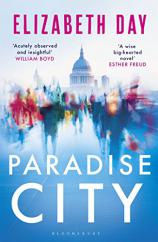Paradise City
Review
Paradise City
A novel balancing the perspectives of four diverse characters can be a challenge even for the most adept of writers. And trying to tie the various plots together into a cohesive whole can result in a narrative mess. But when a writer is successful in presenting distinct yet connected points of view in one novel, and when that book is engaging and smart, it is truly worth reading. Elizabeth Day's new novel, PARADISE CITY, is an example of the latter: an ambitious plot peopled by assorted figures, each finely drawn and believable, delivered in a well-written package.
The four characters here are Howard Pink, Beatrice Kizza, Esme Reade and Carol Hetherington, all of whom live in London. Each starts from a point distant from the others and is moved, sometimes with shocking speed and other times almost imperceptibly, toward each other and a series of emotional resolutions.
"As an exploration of urban life, PARADISE CITY is great. As an examination of the modern human condition, it is fantastic. Though Day clearly puts effort into giving her characters depth, the result doesn't feel forced or overwritten."
Sir Howard Pink is a self-made millionaire and the boss of a popular chain of clothing stores. Yet, as a child of poor Jewish immigrants, he has never felt fully comfortable in the circles of the rich and aristocratic in which he travels. Most essentially, he is still struggling with the heartbreak and fear caused by his teenage daughter's disappearance 11 years ago. A terrible decision to sexually molest a stranger brings Howard into the life of hotel maid Beatrice. She is a refugee from Uganda who had to flee her own country when her homosexuality was discovered. When Howard assaults her at work, it’s the last straw: as a woman who has suffered abuse and rape, she decides to take a stand and make demands.
As Beatrice finds a strength and a voice, and as Howard wallows in guilt and shame, he meets Esme, a young journalist torn between professional integrity and just getting ahead in her field. She lands an interview with the millionaire and finds that behind the blustery public image is a hurting man with whom she shares some things in common.
While Howard, Esme and Beatrice come together, Carol remains a satellite of their story. A recently widowed mother and grandmother, she shares a deep sense of loss, sadness and loneliness with the other three. When she makes a gruesome discovery in her neighbor's garden, her life begins to change in ways she never imagined. Though horrified by what she finds next door and terrified by the closeness of it, Carol is forced to abandon her routine of mourning when the tragedy introduces her to Howard.
As an exploration of urban life, PARADISE CITY is great. As an examination of the modern human condition, it is fantastic. Though Day clearly puts effort into giving her characters depth, the result doesn't feel forced or overwritten. Her style is intelligent and easy, giving readers a tale that is both provocative and entertaining. The voice of each character is unique and well-developed. The book tackles some serious issues, like sorrow and isolation, but balances the heaviness with some lightness and lots of heart. It’s optimistic without being predictable or saccharine, and elegant without being fussy.
While Howard's storyline is a touch repetitive, it is the lynchpin that holds the novel together and allows for moments of fascinating transformation and realization. Overall, PARADISE CITY is a success.
Reviewed by Sarah Rachel Egelman on December 11, 2015
Paradise City
- Publication Date: February 14, 2017
- Genres: Fiction
- Paperback: 368 pages
- Publisher: Bloomsbury Paperbacks
- ISBN-10: 140885502X
- ISBN-13: 9781408855027





